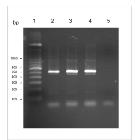ABSTRACT
More than 300 species have been described in the genus Hepatozoon, occurring in different vertebrates. Among these, only Hepatozoon canis and Hepatozoon americanum are seen in dogs. Different methods may be used for laboratory diagnosis. The most common of these is direct parasitological examination of parasite stages in blood smears. The aim of this investigation was to conduct a phylogenetic study on Hepatozoon isolates from symptomatic dogs in the city of Goiânia, Goiás, Brazil. Blood samples were obtained from 40 symptomatic dogs that had been referred to the Veterinary Hospital of the Federal University of Goiás. Among these, only two samples were positive for Hepatozoon spp. using the direct parasitological method. These samples were then subjected to a DNA extraction process and amplification of a fragment of the 18S rRNA by means of PCR. Subsequently, the PCR products from each sample were purified and sequenced. The sequences obtained were then analyzed using the BLASTn algorithm, which identified both sequences of this study as Hepatozoon canis. By applying the Mega4 software, it was confirmed that these isolates of H. canis from dogs in Goiânia are similar to other reference isolates of the same species from other regions of Brazil and worldwide.
Keywords:
Canis familiaris; hepatozoonosis; molecular epidemiology; phylogeny

 Thumbnail
Thumbnail
 Thumbnail
Thumbnail
 Thumbnail
Thumbnail


